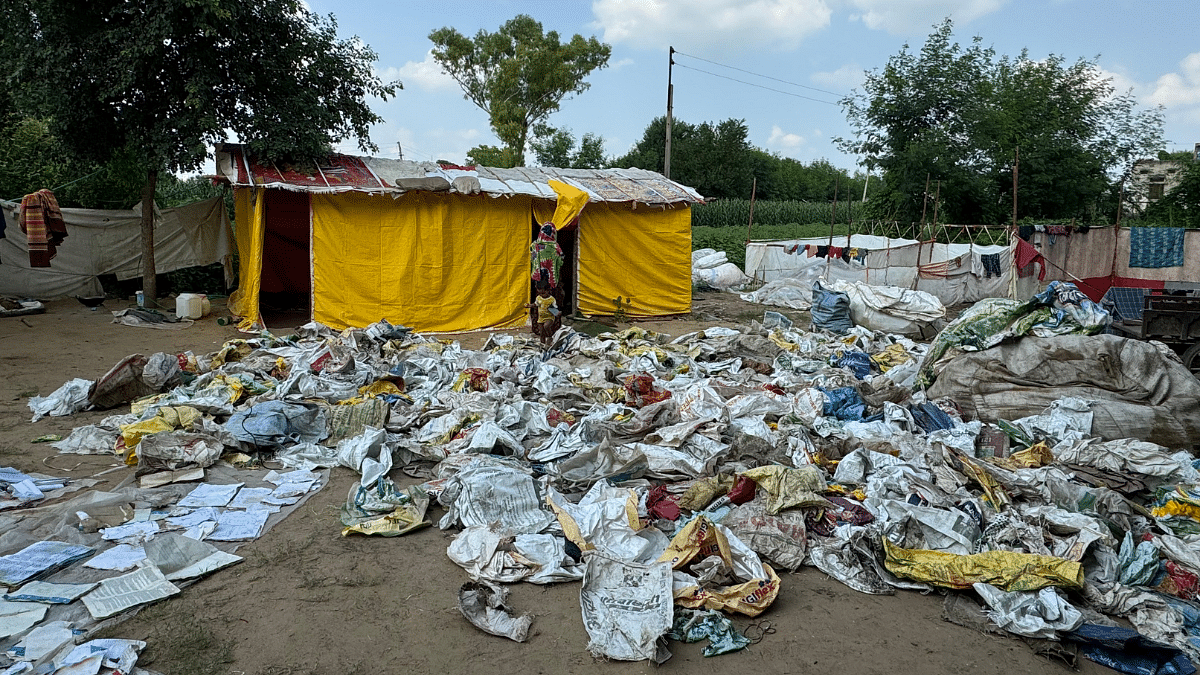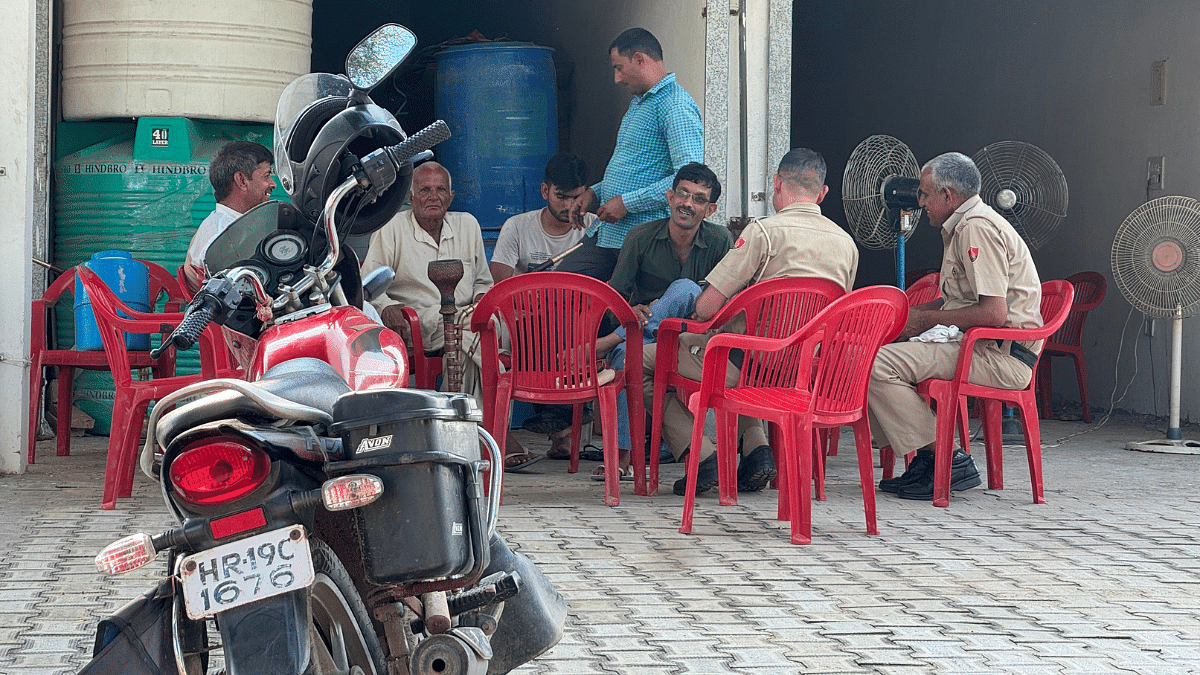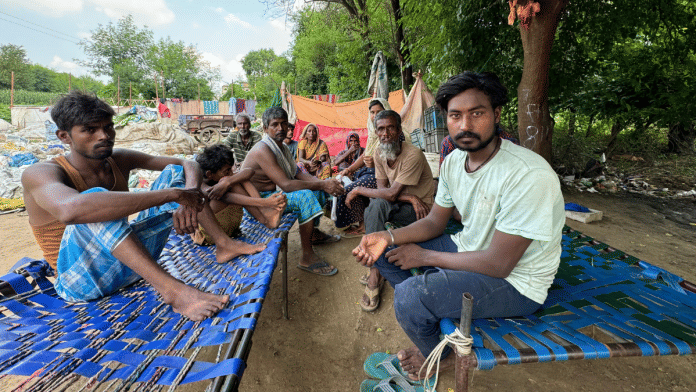Charkhi Dadri (Haryana): Zahir ul Islam, 24, was in custody at Badhra police station when he learned that his friend, Sabir Malik, a ragpicker from West Bengal, had been brutally lynched by a mob.
“When a police officer told me about Sabir bhai‘s death, a shiver ran down my spine. My first thought was that it could have been me if I hadn’t been in the lockup,” Islam recounted, seated on the blue cot outside his shanty in Hansawas Khurd village of Charkhi Dadri district in Haryana.
Malik, 25, was attacked by a group of about a dozen men near the Badhra bus stand, allegedly for consuming cow meat.
On 27 August, Malik and his friend Asserudin were lured to a shop near the bus stand by a group of young men under the pretence of offering them scrap materials where they were ambushed with sticks. Asserudin fled, but Malik was taken away by the vigilantes on a motorbike and beaten to death. His lifeless body was later found near his shanty.

Now an eerie silence covers this village that is home to migrant labourers, mostly Jats and Dalits. Residents blame the killing on Haryana’s charged political atmosphere and the fuel it has received from the upcoming elections. The police have heightened security in the area; the DSP said that a section of SSB has been deployed along with the police that are monitoring social media. SHOs across Haryana and DSPs in other districts are holding meetings, where representatives are being sensitised to maintain peace and ignore rumours on social media.

The community of migrant labourers, especially from Assam and West Bengal, are a terrified lot and no amount of armed police makes them feel safe. Like in previous instances, the lynching also witnessed a pattern of double harassment that includes a direct attack at the hands of vigilantes and then the use of the cow protection law to engage police. But the residents of Hansawas Khurd are able to see through the return of the cow politics that has cost a life. Behind such attacks is a group of unemployed men acting as foot soldiers, collecting data at the tehsil level—about people and what they eat.
Haryana’s political landscape has been increasingly focused on cow protection since 2014. In 2015, the state government led by Manohar Lal Khattar enacted the Haryana Gauvansh Sanrakshan and Gausamvardhan (HGSG) Act, banning cow trafficking, slaughter, and beef possession and consumption.
With elections looming, Chief Minister Nayab Saini downplayed the lynching, focusing instead on villagers’ reverence for cows. “If they are informed about such things, who can stop them?” the CM said.
Villagers revere cows. If they are informed about such things, who can stop them?
— Haryana CM Nayab Saini
Haryana SP Pooja Vashisth said eight people have been arrested so far. While one has been sent to jail, two juveniles are in a child correction centre, whereas the remaining five are in police remand for the next seven days.
Also read: Ghaziabad’s Pinky Chaudhary quit Bajrang Dal to ‘save Hinduism’. It wasn’t aggressive enough
Lynching despite police involvement
Islam and other migrant workers in Hansawas Khurd have not gone to work for the past two days. Despite police protection outside their shanties, they feel unsafe.
“What if someone attacks us on our way?” asks Islam, holding his two-year-old daughter.
The trouble began on 25 August when Islam and others went to buy meat 30 km away from Charkhi Dadri. Malik was not with them.
“It was not cow meat. It was bhains (buffalo),” said Islam.
The following evening, around 9.30 pm, about half a dozen men barged into the shanties, accusing the residents of being Bangladeshis and demanding their Aadhaar cards.
“We showed them our Aadhaar cards, and they quietly left,” said Islam.
But the harassment didn’t stop there. On 27 August, Islam received a frantic call from his wife, Nazma Khatoon, saying that a group of 15-20 men were forcefully entering the shanties, inspecting their food, and beating their cousin, Azher.
“They accused us of eating cow meat. I said it was buffalo, but they didn’t listen and kept beating me until the police arrived,” said Azher.
The police seized the meat and sent it for testing in Faridabad, and detained Islam his brother, and other men.
“The police asked us if we had eaten cow meat. We said no, but they said they would keep us in custody for a few days because the situation outside had become tense,” said Islam.
Residents of Hansawas Khurd squarely blame the BJP-led state government for the lynching and the state’s tarnished reputation.
Captain Rajender Singh, whose farm is adjacent to the shanties, said they never had any issues with the migrant workers.
“See, elections are around the corner, and suddenly these incidents are happening. Also, these youths (accused) are mostly unemployed and have nothing else to do,” said Singh.
Rajesh Kumar, a grocery store owner, agrees with Singh, saying the accused should have involved the police rather than taking the law into their own hands.
Also read: NCR gau rakshaks are a different lot. Engineer, environmentalist, Christian banker
Role of Gau Raksha Dal
The lynching incident follows the formation of the Gau Raksha Dal (cow protection group) in Bhadra. Last year, its president in Haryana, Acharya Yogendra, formed a group of ‘cow protectors’ at an Arya Samaj temple in the Bhadra tehsil. Ravinder Sheoran was appointed the group president. Sheoran is one of the eight accused.
“All eight accused, including two juveniles, are associated with Gau Raksha Dal. They had informed the police about their suspicions, and we were investigating when the killing took place,” said DSP Bharat Bhushan.
Since the formation of Gau Raksha Dal, residents have reported heightened scrutiny regarding who is eating what, especially targeting Muslims.
A resident who wished to remain anonymous said that the Gau Raksha Dal has several foot soliders who gather information on everyone in the tehsil.
“These foot soldiers, mostly unemployed men, are connected to each other on a WhatsApp group and exchange real-time information on what’s happening around the villages,” said the resident.
Since the implementation of the HGSG Act 2015, Haryana has witnessed an increase in lynching incidents.
A senior IAS officer in Haryana said that the law has emboldened cow vigilantes who believe they can lynch and escape accountability. “Also, these cow vigilantes have their own following—Monu Manesar or Bittu Bajrangi. If you arrest them, people come out on the streets to protest,” said the officer.
“These cow vigilantes have their own following—Monu Manesar or Bittu Bajrangi. If you arrest them, people come out on the streets to protest
— IAS officer
A community in fear
Islam arrived in Charkhi Dadri from Assam two months ago and had become friends with Malik, a migrant worker from West Bengal. Malik, who lived with his wife and two-year-old daughter, was a cheerful person who, like many others, had come to Haryana to earn a living.
Malik had been in Charkhi Dadri for a couple of years and often guided newcomers like Islam, Asserudin, and others on matters of rag-picking—what to collect, what to avoid, and where to sell. He often told fellow migrant workers, who were considering moving to Delhi, that people in Haryana were nicer than those in the metro city.
“He was like our elder brother. But we hadn’t known him for long. We had been here only for two months,” said Mohammad, another migrant worker.
Now, Malik’s entire family, including his wife, daughter, and brother-in-law, have left. “They won’t ever return,” Mohammad added.
For the past three days, the police have been providing food to the workers, currently living together in the village. Plastic bags, scrap items, and plastic bottles are scattered outside the shanties, alongside two blue cots where the labourers sit.
They discuss how eating buffalo meat is common in Assam and express their disbelief that it has become such a contentious issue.
“We know Hindus revere cows. That’s why we kept repeating we were eating buffalo meat. We never thought what we eat would become an issue one day,” Islam said, his wife nodding in agreement.
Islam, who came to Haryana with his family and in-laws, said that for a poor person, the only dream is to get two meals a day. “I thought I would work here day in and day out, earn some money, and save for my daughter’s wedding.”
After Malik’s killing, other migrant workers are planning to return to Assam.
“How long can the police protect us here?” asked Mohammad.
“We don’t feel safe here anymore. We will return to Assam in a few days,” said Islam, as his two-year-old daughter came running with his footwear.
(Edited by Prashant)






